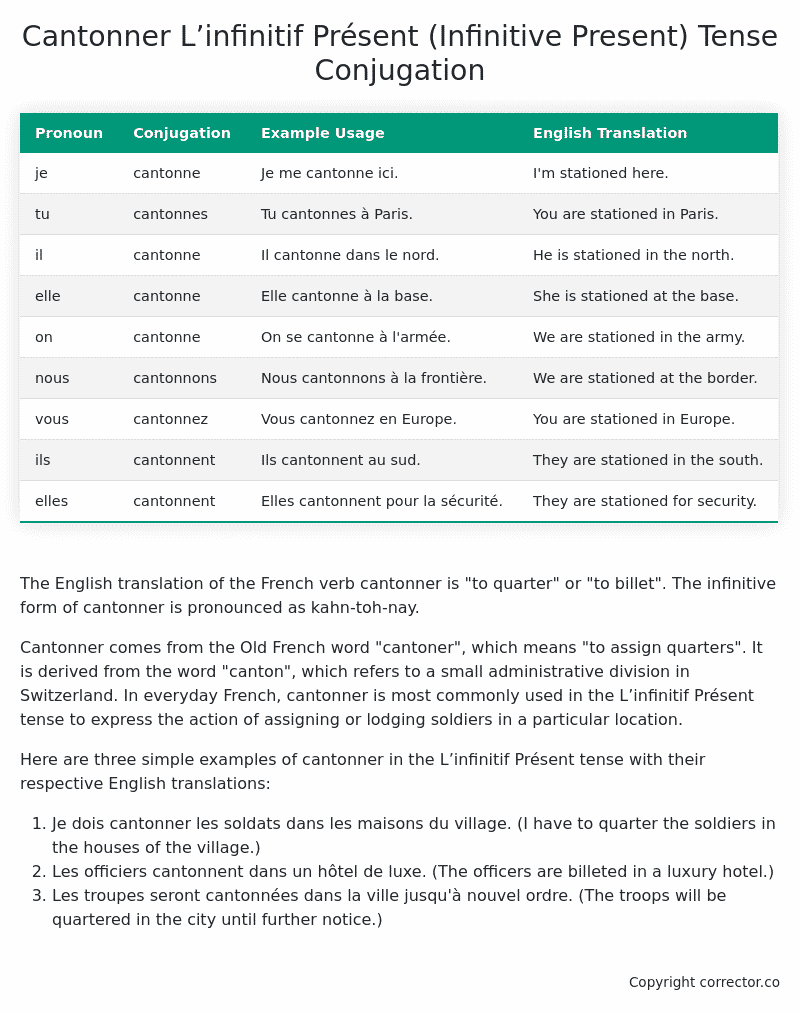L’infinitif Présent (Infinitive Present) Tense Conjugation of the French Verb cantonner
Introduction to the verb cantonner
The English translation of the French verb cantonner is “to quarter” or “to billet”. The infinitive form of cantonner is pronounced as kahn-toh-nay.
Cantonner comes from the Old French word “cantoner”, which means “to assign quarters”. It is derived from the word “canton”, which refers to a small administrative division in Switzerland. In everyday French, cantonner is most commonly used in the L’infinitif Présent tense to express the action of assigning or lodging soldiers in a particular location.
Here are three simple examples of cantonner in the L’infinitif Présent tense with their respective English translations:
- Je dois cantonner les soldats dans les maisons du village. (I have to quarter the soldiers in the houses of the village.)
- Les officiers cantonnent dans un hôtel de luxe. (The officers are billeted in a luxury hotel.)
- Les troupes seront cantonnées dans la ville jusqu’à nouvel ordre. (The troops will be quartered in the city until further notice.)
Table of the L’infinitif Présent (Infinitive Present) Tense Conjugation of cantonner
| Pronoun | Conjugation | Example Usage | English Translation |
|---|---|---|---|
| je | cantonne | Je me cantonne ici. | I’m stationed here. |
| tu | cantonnes | Tu cantonnes à Paris. | You are stationed in Paris. |
| il | cantonne | Il cantonne dans le nord. | He is stationed in the north. |
| elle | cantonne | Elle cantonne à la base. | She is stationed at the base. |
| on | cantonne | On se cantonne à l’armée. | We are stationed in the army. |
| nous | cantonnons | Nous cantonnons à la frontière. | We are stationed at the border. |
| vous | cantonnez | Vous cantonnez en Europe. | You are stationed in Europe. |
| ils | cantonnent | Ils cantonnent au sud. | They are stationed in the south. |
| elles | cantonnent | Elles cantonnent pour la sécurité. | They are stationed for security. |
Other Conjugations for Cantonner.
Le Present (Present Tense) Conjugation of the French Verb cantonner
Imparfait (Imperfect) Tense Conjugation of the French Verb cantonner
Passé Simple (Simple Past) Tense Conjugation of the French Verb cantonner
Passé Composé (Present Perfect) Tense Conjugation of the French Verb cantonner
Futur Simple (Simple Future) Tense Conjugation of the French Verb cantonner
Futur Proche (Near Future) Tense Conjugation of the French Verb cantonner
Plus-que-parfait (Pluperfect) Tense Conjugation of the French Verb cantonner
Passé Antérieur (Past Anterior) Tense Conjugation of the French Verb cantonner
Futur Antérieur (Future Anterior) Tense Conjugation of the French Verb cantonner
Subjonctif Présent (Subjunctive Present) Tense Conjugation of the French Verb cantonner
Subjonctif Passé (Subjunctive Past) Tense Conjugation of the French Verb cantonner
Subjonctif Imparfait (Subjunctive Imperfect) Tense Conjugation of the French Verb cantonner
Subjonctif Plus-que-parfait (Subjunctive Pluperfect) Tense Conjugation of the French Verb cantonner
Conditionnel Présent (Conditional Present) Tense Conjugation of the French Verb cantonner
Conditionnel Passé (Conditional Past) Tense Conjugation of the French Verb cantonner
L’impératif Présent (Imperative Present) Tense Conjugation of the French Verb cantonner
L’infinitif Présent (Infinitive Present) Tense Conjugation of the French Verb cantonner (this article)
Struggling with French verbs or the language in general? Why not use our free French Grammar Checker – no registration required!
Get a FREE Download Study Sheet of this Conjugation 🔥
Simply right click the image below, click “save image” and get your free reference for the cantonner L’infinitif Présent tense conjugation!

Cantonner – About the French L’infinitif Présent (Infinitive Present) Tense
Forming the Infinitive Present
Common Everyday Usage Patterns
As a Verb’s Dictionary Form
After Modal Verbs
As an Imperative
In Infinitive Clauses
Interactions with Other Tenses
Present Tense
Future Tense
Conditional Tense
Passé Composé
Imperfect Tense
Subjunctive and Conditional Moods
Summary
Want More?
I hope you enjoyed this article on the verb cantonner. Still in a learning mood? Check out another TOTALLY random French verb conjugation!


